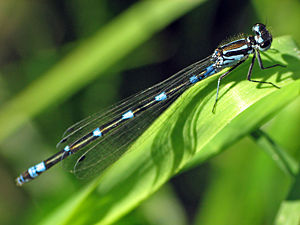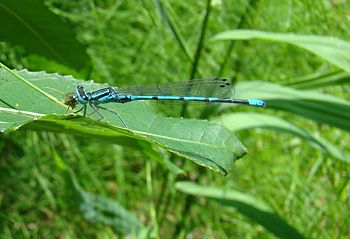Damselfly
Jump to navigation
Jump to search
| Damselfly | ||||||||||||||||
|---|---|---|---|---|---|---|---|---|---|---|---|---|---|---|---|---|
 (CC) Photo: Marko Kivelä
Common Blue Damselfly (Enallagma cyathigerum) | ||||||||||||||||
| Scientific classification | ||||||||||||||||
| ||||||||||||||||
| Families | ||||||||||||||||
|
Damselfly is the an insect of the Suborder Zygoptera in the order Odonata. It is characterized by an elongated body, two pairs of wings with hindwing being essentially similar to the forewing, and large, separated multifaceted eyes. In most species, the wings are held along the body when at rest, which distinguishes damseflies from dragonflies. Damselflies are also usually smaller (in particular with notably thinner abdomen) and weaker fliers than dragonflies.
Characteristics
Behavior
Life cycle
Mating
Eggs
Larvae
Adults
Taxonomy
==See also==
